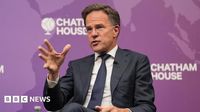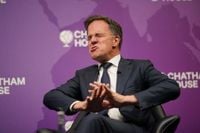NATO Secretary-General Mark Rutte delivered a stark warning on Monday, June 9, 2025, emphasizing the urgent need for a dramatic increase in defense spending and capabilities to counter mounting threats from Russia and its allies. Speaking at the prestigious Chatham House in London, Rutte called for a "quantum leap" in collective security, urging NATO members to boost their air and missile defense by 400% to maintain credible deterrence across the alliance's 32 member states.
Rutte’s call comes ahead of a critical NATO summit scheduled for later this month in The Hague, where the alliance is expected to agree on a landmark defense spending target. The proposal, designed to satisfy demands from U.S. President Donald Trump, would see NATO countries commit to spending 5% of their gross domestic product (GDP) on defense and related security areas. This figure breaks down into 3.5% on core defense expenditures, such as military forces and equipment, and an additional 1.5% on broader security investments, including cyber defense and infrastructure.
Highlighting the persistent and evolving dangers facing NATO, Rutte warned that "threats facing the alliance will not disappear even when the war in Ukraine ends." He underscored the scale of Russia’s military production, noting that "in terms of ammunition, Russia produces in three months what the whole of NATO produces in a year," and that Moscow's defense industry is expected to roll out 1,500 tanks, 3,000 armored vehicles, and 200 Iskander missiles in 2025 alone. Such figures paint a grim picture of Russia’s capacity to sustain and escalate military aggression.
The NATO chief also stressed the strategic partnership between Russia and other authoritarian states, warning that "Russia has teamed up with China, North Korea, and Iran," all rapidly expanding their military capabilities. China, in particular, is modernizing its forces at a breakneck pace, with the world’s largest navy expected to grow to 435 ships by 2030.
Rutte issued a chilling forecast: "Russia could be ready to use military force against NATO within five years," and cautioned that the new generation of Russian missiles travel many times the speed of sound, shrinking the response time between European capitals to mere minutes. "There is no longer east or west. There is just NATO," he said, underscoring the blurred lines of modern warfare and the shared vulnerability of all member states.
To counter these threats, Rutte called for a comprehensive buildup of NATO’s military assets beyond missile defense. "Our armed forces also need thousands more armored vehicles and tanks, millions more artillery shells, and we must double our enabling capabilities such as logistics, supply, transportation, and medical support," he explained. This buildup is intended not only to replenish reserves depleted by aid to Ukraine but to prepare for a sustained defense posture in the years ahead.
Rutte’s remarks came shortly after a bilateral meeting with UK Prime Minister Sir Keir Starmer, who echoed the importance of NATO as "the cornerstone of our defense" and praised the alliance as "the most effective military alliance the world has ever seen." The UK government has pledged to increase military spending from 2.3% of GDP to 2.5% by 2027, with ambitions to reach 3% by 2034. According to Sky News, the UK is expected to commit to raising defense expenditure to 3.5% within a decade, aligning with NATO’s broader 5% spending target when including related security areas.
Rutte praised the UK’s strategic defense review unveiled last week, describing it as "really broad" and impactful, covering traditional military needs as well as innovation, drones, and strengthening the defense industrial base. He reassured that there is no contradiction between the UK’s current plans and NATO’s ambitious goals, stating, "every country is working in cycles to constantly update its own defense strategy." However, he delivered a blunt message to countries lagging behind: "If you do not do this, you could still have the National Health Service, or in other countries their health systems, the pension system, etcetera, but you had better learn to speak Russian."
On the political front, Chancellor Rachel Reeves is set to announce the UK’s spending review on June 11, which is expected to confirm increased funding for defense and health, while other departments may face cuts. Rutte declined to comment on whether tax increases would be necessary to meet defense commitments, stating, "It's not up to me to decide how countries pay the bill." Nonetheless, the pressure to meet NATO’s spending goals is intensifying amid a shifting global security landscape.
The upcoming NATO summit in The Hague, scheduled for June 24–25, is poised to be a defining moment for the alliance. Rutte described the plan as "not some figure plucked from the air," but grounded in hard facts and the harsh realities of contemporary threats. The summit aims to transform NATO into a "stronger, fairer, and more lethal alliance," ensuring it remains fit to safeguard one billion people across North America and Europe.
Russia’s response to NATO’s proposed military buildup has been predictably hostile. Kremlin spokesman Dmitri Peskov condemned NATO as "an instrument of aggression and confrontation," dismissing the alliance’s warnings as an "ephemeral threat" and accusing European taxpayers of funding a fabricated menace. Such rhetoric underscores the deepening divide and the high stakes involved as NATO members prepare to bolster their defenses.
Canada, another NATO member, announced on the same day that it would reach the 2% defense spending target in 2025, reflecting a broader trend of increased military investment among alliance members. Eastern European and Nordic countries have also pledged to ramp up their defense budgets ahead of the summit.
As NATO confronts a complex and volatile security environment, the message from Secretary-General Mark Rutte is unequivocal: the alliance must dramatically enhance its military capabilities and financial commitments to deter aggression and preserve peace. The coming weeks will test the unity and resolve of NATO members as they navigate these critical decisions.





